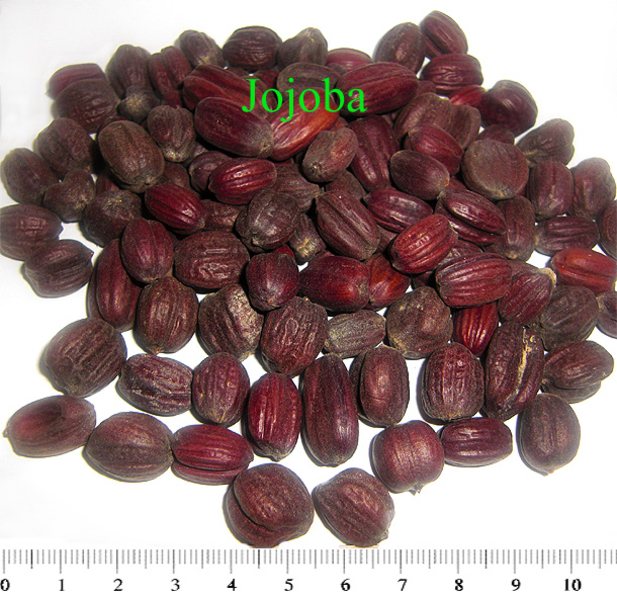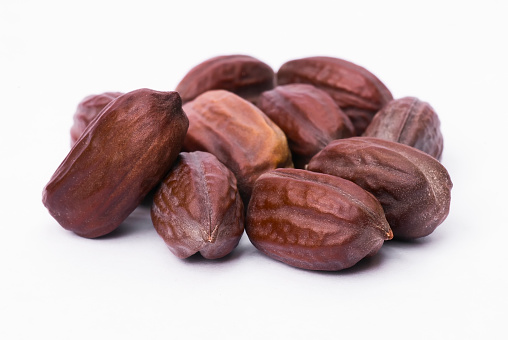
Oil extraction
In addition to the cold pressing process / oil press, in which the ripe seeds are crushed and then mechanically pressed out, the more complex extraction process is also used for oil extraction. Solvents used to dissolve the waxes include benzene, heptane, hexane, isopropyl alcohol, tetrachloroethylene or carbon tetrachloride.
Properties and shelf life
Jojoba oil has a clear, golden yellow color, cosmetic, soapy odor and mild taste.
This oil differs from other vegetable oils in that it is not a mixture of triacylglycerides but of wax esters with a chain length of about 38-44 C atoms. These wax esters are composed of approx. 47-49% fatty acids and approx. 50-52% fatty alcohols. The total fatty alcohol here consists largely of about 45-52% cetoleic acid, 39-46% eicosanoic acid, 6-11% nervonic acid and 1-2% oleic acid. In contrast, the total fatty acid content consists of 66-71% eicosanoic acid, 14-20% cetoleic acid, 10-13% oleic acid and 1-3% nervonic acid. In addition, other ingredients include: Provitamin A, amino acids, minerals and squalene.
The melting point of jojoba oil is about 7° C, the pour point is about 10° C and the flash point is 295° C. Furthermore, the ignition point is found at about 338° C. and the boiling point (under nitrogen) at about 398° C..
Due to the high content of vitamin E tocopherols in jojoba oil, it has a great resistance to oxidation. Therefore, this oil can be stored for up to 20-25 years without becoming rancid. As a result, preservatives are not necessary.
Use
In pharmacy and medicine
In pharmaceutical technology, jojoba oil is used as a liquid wax as a carrier or coating for medical preparations, in penicillin production, in reduction diets and in appetite suppressants. In addition, the oil serves as a natural emulsifier instead of spermaceti and can also be used as a carrier for oxidation-sensitive substances, as it is relatively stable to rancidity.
In cosmetics
In the field of cosmetics, jojoba oil can be used in many different ways. For example, it can be found as a liquid wax in hair setting agents, shampoos, hair sprays, hair dyes, soaps, shaving creams, hand creams, moisturizers, massage and body oils, bath oils, cleansing creams, make-up removers, lipstick, etc., among others.
The oil can have a regulating effect on the moisture balance of the skin and develop a natural sun protection factor of 4.
In industry
In industry, jojoba oil can be used, for example, as a lubricant, as a hard wax or as a fuel. It forms a high quality lubricant that can withstand high pressure and high temperatures. When used as a hard wax, the oil is used in polishing waxes for, among other things, floors, shoes, furniture, for the automotive industry, for protective coatings, for fruit and food, for candles, insulating material and carbon paper. The individual fatty alcohols and fatty acids can also be found in disinfectants, solvents, detergents, plastics (plasticizers), anticorrosives, etc. In addition, several experiments have already been conducted, including in Arabia, to test the effectiveness of jojoba oil as a fuel. It would represent a more environmentally friendly fuel, as it is naturally low in carbon and sulfur-free, and only methanol would need to be added.
In the kitchen
Jojoba oil can be used as a salad oil and also as a frying oil. However, the use of this oil as a cooking oil is discouraged because animal studies have shown that ingestion of jojoba oil for a prolonged period of time can cause changes in the liver, blood count and small intestine.
We will be happy to advise you on this seed and show you options. Contact us
In addition to our own knowledge acquired through pressing tests, the following sources were used to prepare this article:
- Öle, natürlich kaltgepresst, Basiswissen & Rezepte, Marcus Hartmann, Hädecke, 2008
- Heilende Öle, Pflanzenöle als Nahrungs- und Heilmittel, Neue Erkenntnisse, Günter Albert Ulmer Verlag Tuningen
- Lexikon der pflanzlichen Fette und Öle, Krist, Buchbauer, Klausberger, SpringerWienNewYork, 2008
- www.wikipedia.de
- en.wikipedia.org

